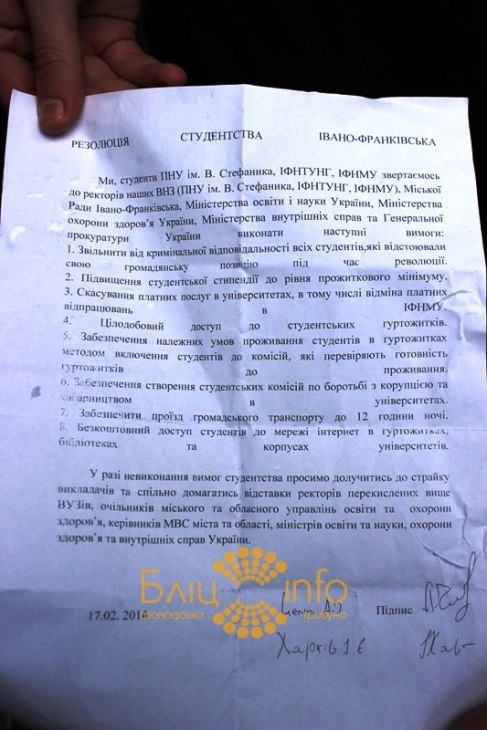Although the mass of students in the city remain fairly passive or disenchanted, an active core – as is usual for any insurgent movements – have set organised and set out demands for a revolution in student life. Activists representing students from all three state universities in Ivano-Frankivsk – the Stefanyk Precarpathian University (PNU), the National Medical University (IFNMU) and the National Oil and Gas University (NUNG) – yesterday marched through the city and occupied the Prosvita cultural centre, close to the local and regional administration building (“White House”). This will be the Headquarters of the Student Resistance (Штаб студентського спротиву).
The students’ eight demands, issued to the universities’ rectors, the city council, and the Ministers of Education, Health, Internal Affairs and to the Prosecutor General, are – as the document below shows:
1) freeing all students arrested and charged during the revolution
2) increasing the student grant to the level of the minimum monthly salary
3) annulment of charges for academic services in universities, including charges for retakes at the Medical University
4) 24-hour access to student halls
5) securing satisfactory conditions in student halls by including students in supervisory councils
6) securing the foundation of commissions against corruption and bribery in universities
7) running public transport until midnight
8) free internet access for students in student halls, libraries and university campuses.
These demands cover most aspects of what affects students on an everyday level, bar perhaps the most obvious thing, which is the organisation of their studies. Despite constant declarations, especially at PNU, of the “European” nature of the university, there is widespread failure to initiate any of the provision of the Bologna Process beyond issuing ECTS credits, which enable students to translate their grades into a European scale should they seek work or further study abroad. Students often have to pay for their ECTS certificate, which should be provided for free. Students are worked beyond the limits for the number of hours stipulated in the Bologna Process provisions. And they have absolutely no choice in the courses they take.
While these eight demands address many fundamental issues affecting student life, I am not certain that these student revolution will gather widespread support without finding a way to overcome a general apathy among the mass of students who remain convinced that the existing system of corruption and a lack of investment in student facilities is insurmountable.
More details on the student protests and photos of yesterday’s march can be found here and here.
